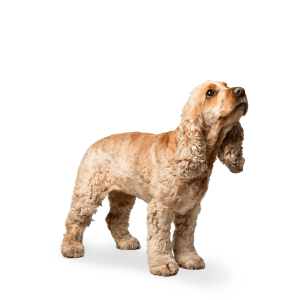

Indoor plants toxic to cats & dogs
Naturally curious, our dogs and cats will spend a lot of time exploring… but not everything they discover is harmless. You might love decking out your home with magnificent displays of flowers and plants. But does this greenery pose a threat to your furry friends? Read on for a list of shrubberies that are more toxic than Britney Spears’ discography…
Do dogs and cats instinctively know what plants to avoid?
Animals in the wild have a mix of instinct, experience and training that might stop them from eating potentially dangerous things. They either learn this through experience, from their parents, or can usually tell by the colour, smell or taste – toxic plants tend to taste extremely bitter for animals.
Domesticated pets share some of the same instincts and training, but as you can imagine, they’re not as clued up as they could be. Cats are usually more sensible when it comes to eating strange things – although that doesn’t stop them from having the occasional nibble. Dogs, on the other paw, will often eat almost anything, including our furniture! If your dog does ingest anything, our top tips for poisoning in dogs will come in handy.

What indoor plants are dangerous for cats and dogs?
When beautifying your home with a range of indoor foliage, it's important to know what could be harmful to your cat or dog. Here's a couple of quick tips before we give you our poisonous plants rundown:
- Always be careful when cutting flowers. Make sure you pick up any trimmings before your pet gets their teeth on them.
- Discover which outdoor plants can be dangerous for your pet if you're bringing flowers from the outside in.
- Remember, this list isn't comprehensive. If your pet has eaten something they shouldn’t, or if you’re simply concerned, be sure to contact your vet straight away!
Aloe Vera
Typically kept as a houseplant year-round, Aloe Vera’s not completely poisonous for your pet. But it can cause diarrhoea if eaten in large amounts, so it's best to avoid keeping it or keep it out of reach.
Azaleas/Rhododendrons
All members of the Rhododendron species contain grayanotoxins. This can cause vomiting, diarrhoea and general weakness in your pet.
Chrysanthemums
If ingested, these popular summer flowers can cause tummy upsets – like vomiting, and diarrhoea.
Conkers and acorns
Commonly kept indoors to deter spiders, these are toxic to dogs – and they’re dangerous for cats as well. It’s rare for a dog or cat to bite these, but if they do, it can cause stomach issues and, if eaten whole, could cause intestinal blockages.
Daffodils
These can be deadly for smaller animals. Even just drinking the water in which your daffodils have stood can be harmful.
Geraniums
Despite being a lovely addition to your windowsill, every part of the Geranium is toxic to both dogs and cats when ingested and can cause stomach upsets.
Hyacinths
The whole plant can be harmful to pets, but especially the bulbs.
Hydrangeas
This shrub contains toxins harmful to pets, with leaves and flowers containing the most. Eating them can cause stomach upsets.

Irises
All parts of the Iris are toxic, but especially the bulb as it contains a larger amount of toxic compounds.
Ivy
If consumed, Ivy can cause abdominal pain, vomiting and diarrhoea.
Lilies
Lilies are considered to be the most toxic plants for cats. Tiny amounts can cause extreme kidney damage. And all parts of the flower – including leaves, stems, petals and even pollen – are harmful. Even just brushing against this flower can be harmful for your kitty. Although not as dangerous, they’re still poisonous for dogs.
Lily of the valley
Often used in bouquets of flowers, this plant is very poisonous to both dogs and cats. It can cause vomiting, diarrhoea and seizures.
Rhubarb
The leaves of this delicious plant are poisonous to dogs and cats, whether cooked or raw. Although not usually kept as an indoor plant, it's important to be mindful if you're bringing Rhubarb into your kitchen.
Tulips
The bulbs of Tulips contain toxins that cause extreme digestive irritation, loss of appetite, convulsions, and heart abnormalities.
Festive foliage
During the holiday period, we bring many different plants into our homes. But watch out for the berries – such as Mistletoe and Holly – as these are unsafe for your pets.
Speaking of Holly, the spiky leaves can damage your pet’s tongue, throat or stomach. Watch out for Poinsettias as well, as these are mildly toxic to both cats and dogs. Find how to keep your dog safe at Christmas.

How to stop your pet from eating indoor plants
If your beloved pet has a penchant for chewing on your beautiful indoor plants, you’re probably combing the web for the perfect solution. Here are some tips:
- Move your houseplants. The quickest – and easiest – solution is to simply move your plants out of reach. Perhaps place them on tall surfaces or invest in some plant stands!
- Train your pet to leave your plants alone. Typical training methods – like positive and negative reinforcement – can be a great tool to get your cat or dog to stop chomping on your plants.
- Spray the plant with diluted lemon juice. Both cats and dogs absolutely hate the smell and taste of citrus. Mist your plants with the juice, but make sure it’s diluted. And voila – your pet will hopefully no longer want to chew on your fabulous fern. Cayenne pepper works just as good!
- Choose plants your cat or dog hates. There’s literally a plant called Scaredy Cat… Yes, we’re being serious. And, as the name suggests, it scares off cats – and most dogs, too!
Having said all that, the best advice is to avoid keeping plants that are toxic to your pets in the first place.



